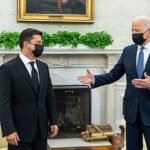On January 4, the European Union’s top diplomat Josep Borrell started his trip to Ukraine amidst elevated tensions prompted by a Russian military build-up near Ukraine’s eastern border. The next day, Borrell flew to the frontline of the conflict in the east of the Luhansk, becoming the first E.U. high representative for foreign policy to have visited the Donbas region since the war broke out in 2014. The European Union’s top diplomat promised “massive consequences and severe costs” for Russia if it launched a new military offensive against its neighbor. Ukraine’s foreign minister, Dmytro Kuleba, who accompanied Borrell on a helicopter trip to the Luhansk region, hailed it as a “sign of Ukraine-E.U. unity in the face of elevated Russian threats.”
An Attempt to Catch Up
Over a month ago, Kyiv and its allies sounded the alarm about the build-up of military equipment and an estimated 100,000 Russian troops near Ukraine’s eastern border, raising fears that Moscow was establishing a pretext for an invasion. The Kremlin denied this and instead put forward a list of conditions, demanding NATO to rule out Ukraine’s possibility of obtaining membership of the alliance, limiting troop and arms deployments on its eastern flank, and returning its forces to the position of 1997, prior to any efforts for eastward enlargement. While the Kremlin’s proposals were handed to the U.S. and NATO, the E.U. has been regarded as part of the west’s coordinated response to Russia’s military maneuvers on the border with Ukraine.
During his visit, Josep Borrell reiterated that the security of Ukraine largely affects the security of Europe as a whole and highlighted that Russia’s annexation of Crimea, its actions in South Ossetia, Abkhazia and Transnistria, as well as its support for the Belarusian dictator, Alexander Lukashenko, had led to a “severe deterioration of the security situation in Europe.” The E.U.’s top diplomat for foreign and security policy also highlighted that the E.U. should be included in discussions on the security of Europe and Ukraine. He claimed that the European Union has been “the most reliable partner of Ukraine” and could not be regarded merely as “a spectator.”
Borrell’s visit and statements largely suggest that the E.U. has been searching for a bigger role in conflict resolution. His trip to Ukraine also preceded the Geneva talks held on January 10 between Russian and U.S. officials as well as the NATO-Russia meeting in Brussels on January 12. Even though US Secretary of State Antony J. Blinken has vowed repeatedly that no decisions will be made about Ukraine without the Europeans, E.U. representatives have not been present in any meetings. Hence, the E.U.’s role in the Russia-Ukraine conflict seems to have somewhat diminished.
Divided E.U. Foreign Policy
Although Borrell’s visit signaled the E.U.’s desire to be a significant player in the region’s security, E.U. member states have long been divided over the issue of neighboring Russia, one of the region’s of the major gas and oil suppliers. There has always been too much inter-state division in the E.U. regarding its common foreign policy toward Russia. The unclear stance has been largely driven by the largest member states, such as Germany and France, for which the lowest common denominator in relations with Moscow has mainly been driven by the engagement for the sake of economic benefits. This has constantly led to the lack of a consensus within the E.U. Despite the ambitions of E.U. leadership to boost the “E.U.’s geopolitical role on the world stage,” the organization’s foreign policy still largely remains dependent on intergovernmental bargaining that is more like a “melting pot” of different opinions on Russia rather than a united stance.
Individual E.U. member states prioritize their own foreign and security policies, and they have been reluctant to hand over much responsibility to Brussels. These states, such as Germany and France, have even favored the so-called selectively engagement policy with the Kremlin, whereas Central and Eastern European members have regarded it as unacceptable. That is why the latter trust Washington and NATO more rather than Brussels to ensure their security and deter Russia.
The West needs to introduce potentially harsh sanctions targeting the North Stream 2 Pipeline, financial sanctions against Russian state-owned banks, and the exclusion of Russia from the international financial communication systems should Russian troops be inserted farther into Ukraine. If Washington decides to impose harsh sanctions on Russia, it will need the support of the E.U., which up to now remains divided on how to best deal with Moscow.
Image Source: Kyiv Post

